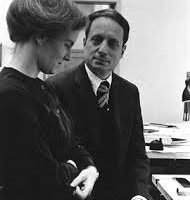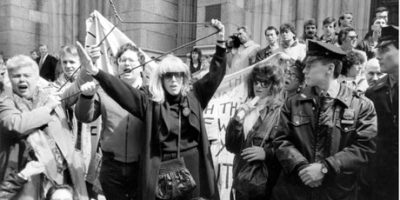At 40, “Fear of Flying”
A conversation with Erica Jong
As the 40th anniversary of Fear of Flying approaches, the evolution of Isadora Wing’s reputation — from slut to savior to classic heroine — begs a critical evaluation of feminist and literary thought over the last four decades.
Fear of Flying came out at the height of second wave feminism. In the years leading up to its publication, Helen Gurley Brown published Sex and the Single Girl, Gloria Steinem and others founded Ms. Magazine, and a group of protestors threw away their bras and high heels to rally against the blatant sexism of the Miss America Pageant.
While Isadora may have been in good company among her feminist contemporaries, not everyone was willing to cheer her sense of freedom. Except for notable writers like Henry Miller and John Updike, many early reviews of the book crucify Isadora as whiny, self-indulgent, and pathologically obsessed with sex. “This crappy novel, misusing vulgarity to the point where it becomes purely foolish, picturing woman as a hapless organ animated by the simplest ridicule, and devaluing imagination in every line…represents everything that is to be loathed in American fiction today.” To sum up Paul Theroux’s review of Fear of Flying in his own words: it was “a mammoth pudenda.”
These indictments did not reflect the literary caliber of the novel, but rather men’s fear that a woman writer could usurp control over sexuality. So the reviewers argued that this book was simply about sex, and sex could be thrown aside as tawdry sensationalism. Early reviews needed this hook to keep Isadora from communicating her true message. It’s easier to parse out what Isadora’s body does than what her mind thinks. As Terry Stokes wrote in a 1973 review for The New York Times, “Isadora is as passive in the end as she was in the beginning. Oddly, the narration denigrates all women by casting them in her mold; people who don’t know what they want.” Sex for women was ostensibly just sex. And if sex was sex was sex was sex, then Isadora Wing was a harlot, Erica Jong was a provocateur, and Fear of Flying was nothing more than a “crappy novel.”
Neatly categorized as smut, the screaming, liberating voices of this narrative could be silenced. Women had to be passive and confused because these men were afraid to give up their dominion over sex — writing about it, talking about it, enjoying it — that was their power. Deeper than this superficial fear was the idea that a woman could be using sex as a metaphor, as an exploration of female identity. The novelty of such a connection, between body and soul, especially in a female character, was unfamiliar and terrifying to early critics.
Henry Miller and John Updike were able to understand these complexities from the beginning. Miller wrote “I feel like predicting that this book will make literary history, that because of it women are going to find their own voice and give us great sagas of sex, life, joy and adventure.” Updike proclaimed in a New Yorker article, “Fear of Flying not only stands as a notably luxuriant and glowing bloom in the sometimes thistly garden of ‘raised’ feminine consciousness but belongs to, and hilariously extends, the tradition of Catcher in the Rye and Portnoy’s Complaint.”
Isadora was searching for something greater than the zipless fuck, she was searching for the zipless self. An identity that had been buried through years of men and family and analysis, and she was finally ready to pull the zipper down and discover who she might actually be — a much scarier journey than any of the early male reviewers could have anticipated.
Aryanna Garber: Many writers would have been disheartened by the harsh criticism your book received at first.
Erica Jong: I was very discouraged by how misunderstood I was. In 1973 and 1974, there were these lacerating reviews from people like Paul Theroux and Martin Amis, but there were also celebratory reviews from the New Yorker, Henry Miller and others who loved the book. It was all very confusing to me, because on the one hand I was being told I was writing crappy and vulgar porn and on the other hand that I had invented something new.
But things really changed for me when the letters started pouring in from readers saying, “You have changed my life,” and they weren’t all from women. The most common letter I received at that juncture, around 1975-76, was people writing “I’m looking at my life in a different way, you’ve written the story of my life.”
So I began to have a little more confidence in the book at that point. The readers’ enthusiasm started coming, and in addition to the letters, I would see copies of the book in which every other sentence was underlined and starred. I thought, well, I’ve unlocked something in these readers and they’re very grateful.




